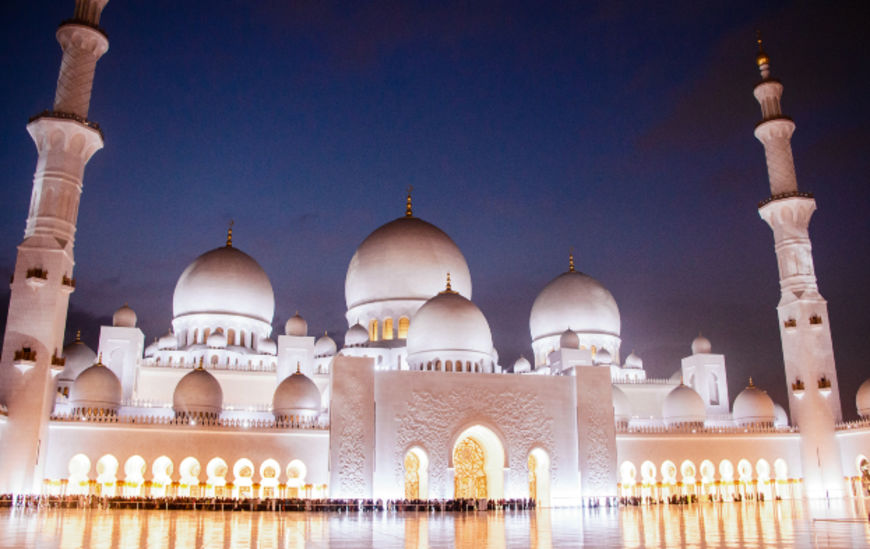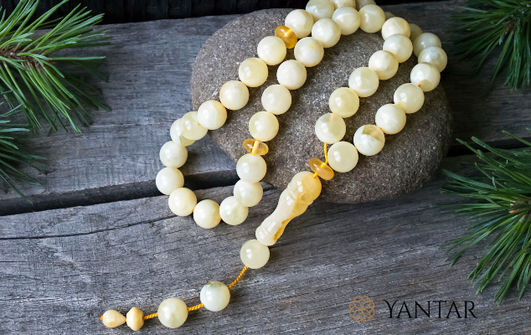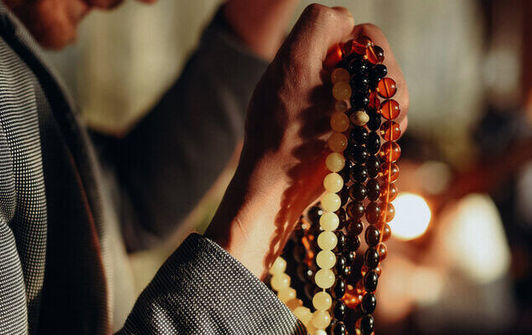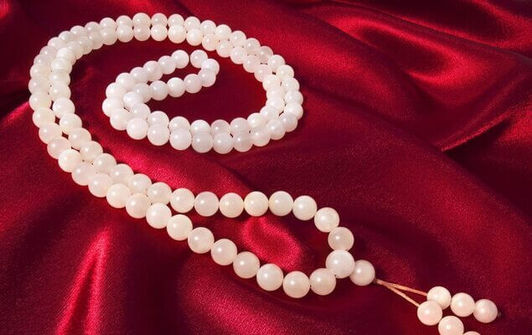
The Night of Power, known in Arabic as Laylat al-Qadr, is regarded as the holiest night in the Islamic calendar. It is the night when the Qur’an was first revealed to the Prophet Muhammad (PBUH) by the angel Jibril (Gabriel). Falling within the last ten days of Ramadan, specifically during one of the odd-numbered nights, Laylat al-Qadr holds immense significance for Muslims around the world. It is believed that prayers offered on this night are worth more than a thousand months of worship. In this article, we’ll explore the spiritual importance of Laylat al-Qadr, its associated rituals, and the use of prayer beads, including amber beads, in this sacred night of reflection and prayer.
The Significance of Laylat al-Qadr
Laylat al-Qadr is mentioned directly in the Qur’an in Surah Al-Qadr (Chapter 97), which states:
"Indeed, We sent the Qur’an down during the Night of Power. And what can make you know what the Night of Power is? The Night of Power is better than a thousand months. The angels and the Spirit descend therein by permission of their Lord for every matter. Peace it is until the emergence of dawn." (Qur’an 97:1-5)
This passage highlights the profound importance of the night, making it a time for Muslims to seek spiritual rejuvenation, forgiveness, and mercy from God. Laylat al-Qadr represents the night when the Qur’an was revealed to guide humanity, and it marks the start of the prophetic mission of Muhammad (PBUH).
When Is Laylat al-Qadr?
Though the exact date of Laylat al-Qadr is not explicitly mentioned, it is widely believed to occur during the last ten days of Ramadan, on one of the odd-numbered nights (the 21st, 23rd, 25th, 27th, or 29th night). Many Islamic scholars suggest that Laylat al-Qadr most likely falls on the 27th night of Ramadan. However, it remains uncertain to encourage believers to seek it diligently throughout the final days of Ramadan.
The Spiritual Importance of Laylat al-Qadr
Laylat al-Qadr is an opportunity for Muslims to earn a tremendous amount of reward in a short time. It is said that worship on this night is equal to more than 83 years of devotion, a lifetime of worship packed into one night. This extraordinary blessing encourages Muslims to engage in extra acts of worship, especially during the last ten nights of Ramadan. Some key benefits of Laylat al-Qadr include:
-
Forgiveness of sins: One of the primary goals of seeking Laylat al-Qadr is to obtain forgiveness for past sins. The Prophet Muhammad (PBUH) said, "Whoever stands (in prayer) during Laylat al-Qadr with faith and seeking reward will have all of their previous sins forgiven" (Sahih Bukhari).
-
Mercy and blessings: The night is filled with divine mercy and blessings, as the angels descend to the earth to bring peace and comfort to those engaged in worship.
-
Acceptance of prayers: Muslims believe that prayers and supplications (du’a) offered on this night are especially powerful and are more likely to be accepted.
Acts of Worship on Laylat al-Qadr
To fully embrace the spiritual essence of Laylat al-Qadr, Muslims engage in various acts of worship, seeking the blessings and rewards of this holy night. Some of the key practices include:
-
Qiyam al-Layl (Night Prayers): Many Muslims increase their prayers during the last ten nights of Ramadan, particularly on Laylat al-Qadr. Extra units of prayer, known as Taraweeh and Tahajjud, are performed to seek closeness to God.
-
Recitation of the Qur’an: Since Laylat al-Qadr marks the night the Qur’an was revealed, Muslims often dedicate time to reciting and reflecting upon its verses, aiming to deepen their understanding and connection with the Holy Book.
-
Dhikr (Remembrance of God): Engaging in the remembrance of God through dhikr is a central practice of the night. Muslims repeat phrases that glorify God, such as “Subhanallah” (Glory be to God), “Alhamdulillah” (Praise be to God), and “Allahu Akbar” (God is the Greatest). This helps maintain mindfulness of God and purifies the heart.
-
Du’a (Supplication): Making sincere supplication is a highly recommended practice on Laylat al-Qadr. The Prophet Muhammad (PBUH) advised his followers to recite a particular du’a: "Allahumma innaka afuwwun, tuhibbul-afwa, fa'fu anni" (O Allah, You are Pardoning and You love to pardon, so pardon me).
-
Charity (Sadaqah): Giving charity on Laylat al-Qadr is considered especially meritorious. Many Muslims use this opportunity to contribute to those in need, ensuring their good deeds multiply on this auspicious night.
The Use of Misbaha (Prayer Beads) on Laylat al-Qadr
One of the most common tools for aiding in the remembrance of God during Laylat al-Qadr is the Misbaha, also known as tasbih or subha. These Islamic prayer beads are used to count the number of times a person recites phrases of dhikr, such as “Subhanallah,” “Alhamdulillah,” and “Allahu Akbar.” The beads serve as a physical reminder to keep the worshipper focused on their prayers and devotion, helping to ensure consistent remembrance of God throughout the night.
Amber Prayer Beads: A Symbol of Spiritual Depth
Among the many materials used to craft misbaha, amber prayer beads stand out for their unique beauty and spiritual significance. Amber, a fossilized resin that has been treasured for centuries, carries both symbolic and physical attributes that enhance the spiritual experience.
-
Amber’s Natural Qualities: Amber is prized for its soothing energy and warm, golden glow, which reflects a sense of tranquility and divine light. Many believe that amber has grounding properties, helping to create a calm and focused mindset during prayer. The smooth texture of amber prayer beads provides a comforting tactile sensation, making them an ideal companion for long sessions of dhikr.
-
Spiritual Symbolism: In Islamic tradition, amber can be seen as a metaphor for spiritual transformation. Just as amber is formed through the natural process of tree resin solidifying over millions of years, the soul undergoes a process of refinement and purification through the practice of dhikr and other acts of worship. Amber prayer beads thus symbolize the journey of spiritual growth and the gradual unveiling of divine wisdom.
-
Health Benefits: In addition to beads spiritual significance, some people believe that amber possesses healing properties. Wearing or using amber beads is thought to promote emotional balance, relieve stress, and improve mental clarity, all of which are beneficial during the intense spiritual focus of Laylat al-Qadr.
Laylat al-Qadr is the most sacred night in Islam, offering Muslims a unique opportunity to seek forgiveness, deepen their relationship with God, and earn rewards that surpass a lifetime of worship. The night is filled with spiritual practices such as extra prayers, recitation of the Qur’an, supplication, and dhikr. The use of prayer beads, particularly amber beads, adds a tangible and symbolic dimension to these practices, helping worshippers stay focused and connected to the Divine.
As the Night of Power approaches, Muslims around the world prepare to make the most of this blessed opportunity, engaging in acts of worship with sincerity and devotion. Whether through the repetition of God's names using misbaha or the silent reflection of their inner self, Laylat al-Qadr remains a time of immense spiritual significance, where the faithful can draw closer to God and seek His mercy and guidance.




 Jewelry
Jewelry Silver amber jewelry
Silver amber jewelry Amber pictures
Amber pictures Souvenirs
Souvenirs